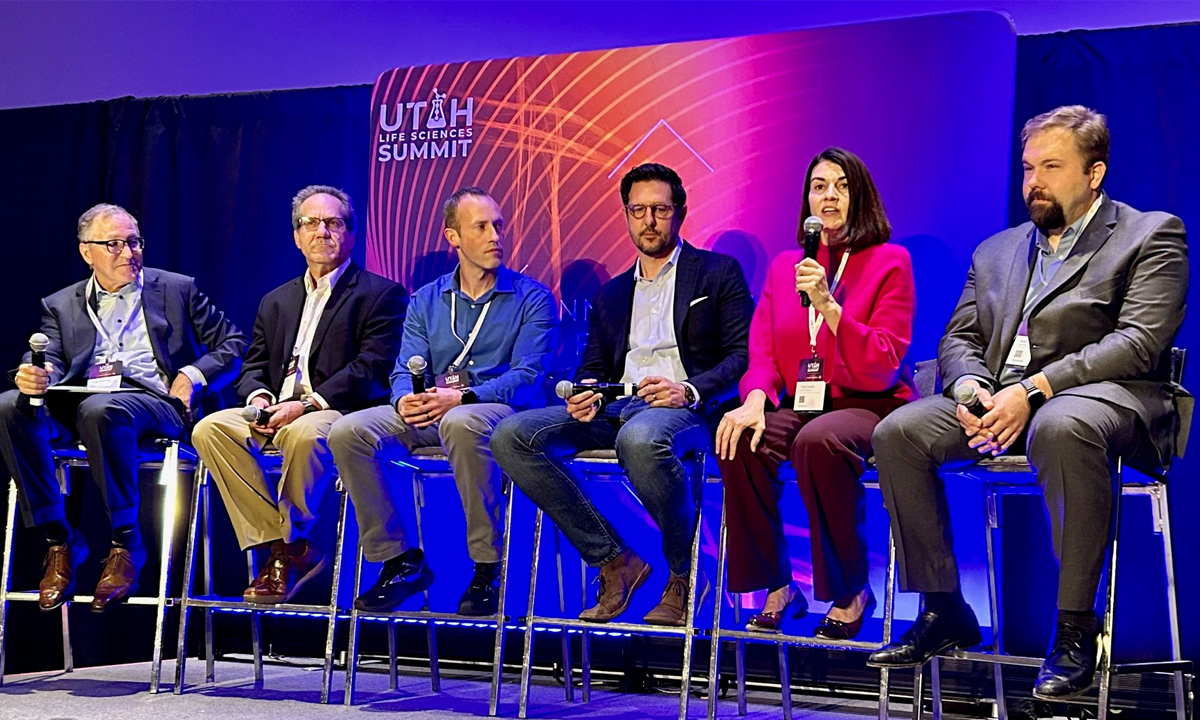
From left, Greg Critchfield, Myriad Genetics and Sera Prognostics; Mark Poritz, Co-Diagnostics; Kyle Berg, Quansys Biosciences; Jared Bauer, Seek Labs; Tracy I. George, ARUP Laboratories; and Andrew Hemmert, bioMerieux. These panelists addressed challenges facing diagnostics companies during a discussion at the Utah Life Sciences Summit in Salt Lake City on November 9.
Tracy I. George, MD, ARUP Laboratories’ chief scientific officer and president of the Innovation Business Unit, joined life sciences industry leaders at the Utah Life Sciences Summit on November 9 in Salt Lake City for a panel discussion on diagnostic advances.
This summit is an opportunity for participants to network, collaborate, and address the challenges facing Utah’s growing life sciences industry, which include the FDA’s proposed rule to regulate laboratory-developed tests (LDTs) as medical devices.
George said the rule is a threat to clinical and academic laboratories, and if enacted, would force laboratories like ARUP to stop offering some tests, potentially limiting access to tests for patients with rare diseases, for example.
“Given the choices that we are going to have to make as a shop with a lot of LDTs, we cannot submit them all to the FDA. It is an expensive process, and it takes a lot of time. I do not think the FDA knows what they are biting off here,” George said. She cited estimates that indicate the FDA would need to hire up to 33,000 regulators to handle the hundreds of thousands of LDTs that would possibly need to be submitted for approval.
Another panelist, Kyle Berg, manager of research and development at Quansys Biosciences, said LDTs go through a rigorous validation process to ensure they are accurate and precise. When a company like his passes a test onto another laboratory, its experts repeat that validation process, “strengthening the power of that LDT.”
Andrew Hemmert, senior vice president of bioMerieux; Mark Poritz, chief scientific officer of Co-Diagnostics; and Jared Bauer, CEO of Seek Labs, also weighed in on the discussion. Moderator Greg Critchfield, co-founder of Myriad Genetics and Sera Prognostics, concluded the panel by acknowledging that the FDA’s proposal would slow the pace of innovation.
ARUP recently released a LabMind podcast episode examining how the FDA restrictions would harm patients and increase costs; listen to “An Interview With Drs. Meghan Delaney and Eric Konnick: How FDA Restrictions on Laboratory-Developed Tests Will Harm Patients and Increase Costs” here.
The FDA is accepting public comments on the proposed rule through December 4. For further information on the rulemaking, consult with the American Clinical Laboratory Association (ACLA), of which ARUP is a member.
Bonnie Stray, bonnie.stray@aruplab.com
















